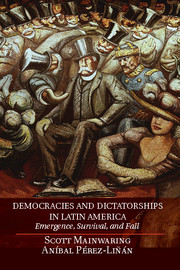Book contents
- Frontmatter
- Dedication
- Contents
- List of Tables
- List of Figures
- Acknowledgments
- 1 Introduction
- 2 A Theory of Regime Survival and Fall
- 3 Competitive Regimes and Authoritarianism in Latin America
- 4 Regime Survival and Fall
- 5 From Multiple Breakdowns to Stabilization of Democracy: Argentina
- 6 From Persistent Authoritarianism to a Durable Democracy: El Salvador
- 7 International Actors, International Influences, and Regime Outcomes
- 8 Political Regimes after the Third Wave
- 9 Rethinking Theories of Democratization in Latin America and Beyond
- Appendix 3.1 Coding Rules for Political Regimes
- Appendix 3.2 Coding U.S. Foreign Policy toward Democracy in Latin America
- Appendix 4.1 Long-Run Equilibrium for the Proportion of Competitive Regimes
- Appendix 5.1 Qualitative Comparative Analysis
- Appendix 6.1 Coding of Salvadoran Actors, 1979–2010
- Bibliography
- Index
6 - From Persistent Authoritarianism to a Durable Democracy: El Salvador
Published online by Cambridge University Press: 05 June 2014
- Frontmatter
- Dedication
- Contents
- List of Tables
- List of Figures
- Acknowledgments
- 1 Introduction
- 2 A Theory of Regime Survival and Fall
- 3 Competitive Regimes and Authoritarianism in Latin America
- 4 Regime Survival and Fall
- 5 From Multiple Breakdowns to Stabilization of Democracy: Argentina
- 6 From Persistent Authoritarianism to a Durable Democracy: El Salvador
- 7 International Actors, International Influences, and Regime Outcomes
- 8 Political Regimes after the Third Wave
- 9 Rethinking Theories of Democratization in Latin America and Beyond
- Appendix 3.1 Coding Rules for Political Regimes
- Appendix 3.2 Coding U.S. Foreign Policy toward Democracy in Latin America
- Appendix 4.1 Long-Run Equilibrium for the Proportion of Competitive Regimes
- Appendix 5.1 Qualitative Comparative Analysis
- Appendix 6.1 Coding of Salvadoran Actors, 1979–2010
- Bibliography
- Index
Summary
In this chapter, we analyze the dramatic and surprising shift from persistent and often brutal authoritarianism to stable democracy in El Salvador. We focus on three questions. First, what explains the persistence of authoritarianism for such an extended time into the twentieth century? With the exception of a few months in 1931, El Salvador had uninterrupted authoritarian rule until 1984. Second, what explains why a transition to a competitive regime occurred despite this profoundly authoritarian past? Third, albeit much more briefly, why has a democratic regime survived notwithstanding performance deficiencies?
Authoritarian rule was chronic because of a consistent severe imbalance between a powerful and fairly stable authoritarian coalition and an extremely weak democratizing coalition. Notwithstanding occasional rifts between big business and some factions of the military, these two actors formed a stable authoritarian coalition that lasted until it was rendered asunder by the civil war in the 1980s. Official governing parties were a third important partner in the authoritarian coalition. In contrast, democratizing coalitions were chronically extremely weak until the emergence of the Christian Democratic Party (PDC) in the 1960s.
and rapid changes in the balance between the authoritarian and democratic coalitions. Powerful actors that had supported extremist agendas and had normative preferences for dictatorship in the 1980s underwent extraordinary transformations. Over the course of a long sanguinary civil war (1980–92), three key actors defected from the conservative authoritarian coalition: ARENA (Alianza Republicana Nacionalista or Nationalist Republican Alliance), which was created in 1981 as an extreme-right party with a normative preference for dictatorship; big business; and the military. The latter two had been the key pillars of the authoritarian regimes that ruled from 1931 to 1979.
- Type
- Chapter
- Information
- Democracies and Dictatorships in Latin AmericaEmergence, Survival, and Fall, pp. 170 - 203Publisher: Cambridge University PressPrint publication year: 2014



